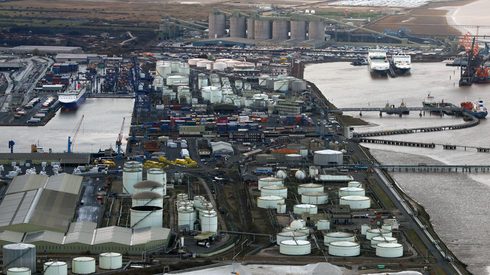Energy major Eni is considering building a new biorefinery to replace an oil-based facility in the Italian city of Livorno, the company said on Monday, a move that would augment its role as a major producer of renewable fuels.
Eni said its decision to commission a feasibility study to build a 500,000 tonnes-per-year biorefinery to produce renewable diesel, and a facility to make hydrogen from methane gas, is part of the company’s wider decarbonization strategy.
The company has previously committed to transforming most of its oil refineries in its home country into biofuels and alternative fuels – and at the same time, shun crude palm oil.
“The construction of the new bio-refinery – located in an industrial area which houses fuel and lubricant production facilities – would maximize synergies from the infrastructure already available and secure the site’s future as an employment and production hub,” the company said in a press release
The Livorno refinery currently produces lubricants, fuel oil, gasoline and ‘special products’, and since earlier this year, has included a module to produce 10,000 tonnes per year of aviation biofuel.
Eni says it is currently the second-largest renewable diesel (hydrotreated vegetable oil) producer in Europe, with a 1.1 million tonnes per year capacity at its refineries in Gela and Venice, which it intends to raise to 2 million tonnes by 2025 and to 6 million tonnes within the next ten years.
The company said a year ago that it aimed to produce 150,000 tonnes of hydro-processed sustainable aviation fuel (SAF) and raise this to at least 500,000 tonnes per year of biojet by 2030.
“The design of the three new plants in Livorno will be completed by 2023, and construction could take place by 2025,” the company said, adding that its plan for the Livorno refinery will be discussed with local authorities and trade unions.
Sourcing new feedstock
The shift away from crude palm oil from 2023 onwards has already prompted Eni to source alternative ‘advanced’ feedstocks that qualify for double-counting under the current version of the Renewable Energy Directive.
Last week, the company said the first cargo of vegetable oil for biorefining produced by Eni in Kenya had been shipped from Mombasa, on its way to the Gela biorefinery, with exports scaling up to 20,000 tonnes in 2023.
The company has signed several offtake deals for feedstock in Europe and Africa. Yet – as well as the renewable diesel sector in general – it faces a major challenge in sourcing sufficient feedstock supplies for expansions and replacing palm oil and other single counted crop-based biofuels that are capped at 7% of total fuel consumption by 2030.
Eni is also considering whether to build renewable diesel and SAF refineries in the US. However, if it went ahead with the plans, the Italian energy major would be a relatively late entrant into the crowded North American biodiesel/renewable sector, where competition for feedstock such as used cooking oil and animal fats is already fierce.





